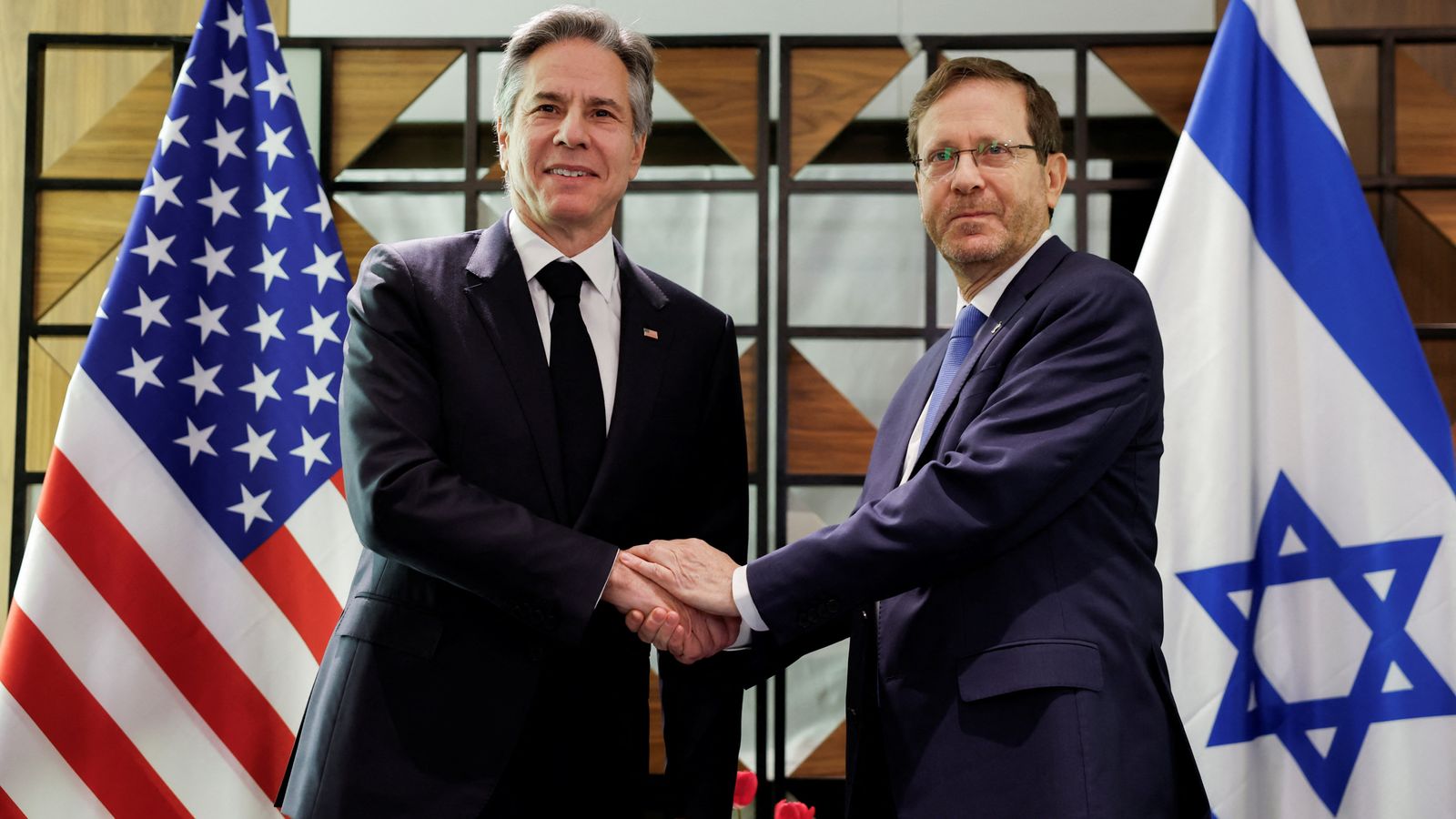Israel’s president Isaac Herzog has said “there is nothing more atrocious and preposterous” than the lawsuit filed in the International Court of Justice accusing his country of genocidal actions against Palestinians in Gaza.
Mr Herzog made the comments as US Secretary of State Antony Blinken was in Israel for his fourth visit in three months.
The Israeli president accused South Africa of hypocrisy for bringing the case, which is due to begin hearings on Thursday, and thanked Washington for its support of Israel.
He added Israel will present its case “proudly” at the International Court of Justice (ICJ) and said his country’s actions in Gaza have been in “self-defence”.
Please use Chrome browser for a more accessible video player
The ICJ hearings will focus on the many civilians who are among the more than 23,000 people health officials in Gaza say have been killed in the war which broke out after Hamas, a Palestinian militant group, launched its surprise attack on Israel on 7 October 2023.
Israel says it tries to avoid civilian casualties when carrying out strikes on Gaza or ground attacks in the territory.
Speaking to Mr Blinken on Tuesday, the Israeli president said: “Actually our enemies, Hamas, in their charter, call for the destruction of our nation, the State of Israel – the only nation-state of the Jewish people.
“We will be there at the International Court of Justice and will present proudly our case of using self-defence under our most inherent right under international humanitarian law.”
Mr Blinken is also meeting with Israel’s prime minister Benjamin Netanyahu and the country’s defence minister Yoav Gallant during his week-long visit.
Mr Herzog has said Israel must win its conflict with Hamas “because it’s a war that affects international values and the values of the free world”.
Read more:
Israeli police accidentally kill young girl
Risk of war spreading ‘rises by the day’ – Jordan
Senior Hezbollah commander killed in Israeli airstrike
Please use Chrome browser for a more accessible video player
Hamas fighters left 1,200 dead and abducted 240 people during the October attacks, according to official figures from Israel.
Since then, Israeli forces have destroyed much of Gaza, and nearly all its 2.3 million people have been driven from their homes at least once, causing a humanitarian catastrophe.
Israel blames Hamas – which has ruled Gaza since 2007- for harm to civilians by hiding among them.
Hamas militants deny operating among the population.
Israel insists it will continue its military offensive until Hamas is dismantled and the remaining 132 hostages are freed.
Middle East correspondent
Antony Blinken has arrived in Israel for his fourth visit in three months, with the situation worsening not improving, as he and the White House might have hoped.
Pressing issues like securing more humanitarian aid for Gazans and the release of more than 130 hostages, have been overshadowed by a growing prospect of a new war between Israel and Hezbollah in Lebanon.
In his press statements over recent days, Mr Blinken has seemed frustrated by Israel and its reluctance to act on American advice, or at least the slow pace at change.
In Doha, Mr Blinken described the current level of aid as “insufficient”, said Israel needed to “better protect civilians”, described Israeli government statements about building Israeli settlements in Gaza as “irresponsible” and made a point of praising the UN for playing an “irreplaceable role” delivering aid – Israel has been highly critical of the UN.
In the days after the 7 October attacks, the US positioned two aircraft carrier groups in the Mediterranean. These were supposed to act as a deterrent to Hezbollah and Iran, not as military cover to enable Israel to expand the conflict.
Officially, the withdrawal of the USS Gerald Ford strike group was for operational reasons – its tour had already been extended twice – but US diplomats in the region told Sky News that the move had taken Israeli officials by surprise, but it was no bad thing if that provided a reminder to Israel that US support wasn’t unequivocal.
The messages from Lebanon, and major regional actors, is that an expansion of the conflict is in no-one’s interest but whilst the fighting in Gaza remains intense and no plan for ‘the day after’ agreed upon, it is clearly proving difficult to make diplomatic progress on many fronts.
Arab governments simply aren’t willing to throw money, or political capital at the problem, until a “practical pathway” for the Palestinian people can be worked through.
Mr Blinken needs to convince Israeli leaders that it is in their interests to reduce tensions and pull back from the most fierce fighting in Gaza, whilst also recognising that Hamas remains operational and a threat inside Gaza and Israel’s objectives are yet to be achieved.
He has some carrots: the resumption of Saudi normalisation talks, the possibility of agreeing a formal border with Lebanon, and a deal to release more, if not all, the hostages from Gaza.
All or any of these would require a significant and swift change to the situation in Gaza however.
He has some sticks too: the US could reduce the military aid it is providing to Israel, or it could remove the diplomatic cover it has given Israel in the UN.
The White House won’t step away from Israel’s side but equally the administration knows it is becoming increasingly isolated on the world stage and is getting little in return for its support of Israeli Prime Minister Benjamin Netanyahu. Opposition to the war is also growing in the US, as President Biden found out on Monday evening when he was heckled at a political rally.
Later today, Mr Blinken will hold another news conference after meetings with the Israeli war cabinet – we might get a better idea then, whether Israel is now prepared to listen more willing to its closest ally and act, or if America’s pleas are again falling on deaf ears.











